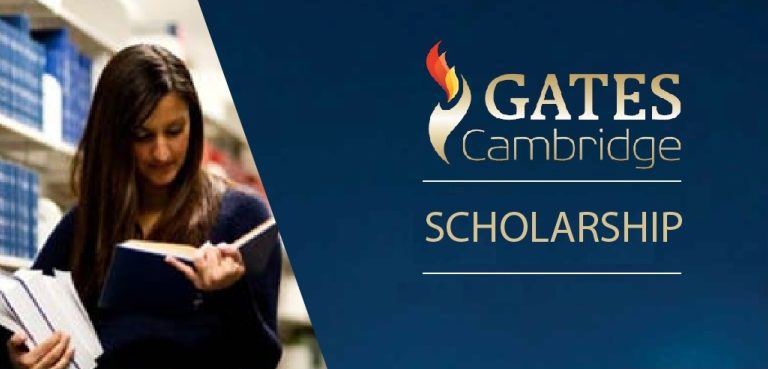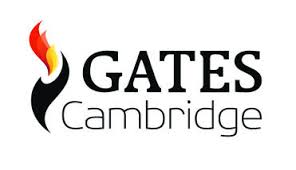Application Deadline: 4 January 2018
The Gates Cambridge Scholarship programme was established in October 2000 by a donation of US$210m from the Bill and Melinda Gates Foundation to the University of Cambridge; this is the largest ever single donation to a UK university.
Scholarships are awarded to outstanding applicants from countries outside the UK to pursue a full-time postgraduate degree in any subject available at the University of Cambridge. The selection criteria are:
- outstanding intellectual ability
- leadership potential
- a commitment to improving the lives of others
- a good fit between the applicant’s qualifications and aspirations and the postgraduate programme at Cambridge for which they are applying
Eligibility Requirements:
You can apply for a Gates Cambridge Scholarship if you are:
- a citizen of any country outside the United Kingdom
- applying to pursue one of the following full-time residential courses of study at the University of Cambridge:
- PhD (three year research-only degree)
- MSc or MLitt (two year research-only degree)
- One year postgraduate course (e.g. MPhil, LLM, MASt, Diploma, MBA etc.)
Courses which are NOT eligible for Gates Cambridge Scholarships:
- BA (undergraduate)
- BA affiliated (a second BA)
- MBBChir Clinical Studies
- MD Doctor of Medicine degree (6 years, part-time)
- Part-time degrees
- Non-degree courses
Scholarship Worth:
The Gates Cambridge Scholarship is one of the most generous international scholarships available. It covers the following costs:
Core components
- the University Composition Fee at the appropriate rate*
- a maintenance allowance for a single student (£14,900 for 12 months at the 2017-18 rate; pro rata for courses shorter than 12 months)
- one economy single airfare at both the beginning and end of the course
- inbound visa costs & the cost of the Immigration Health Surcharge
Discretionary components
The Trust also considers applications for several types of additional funding on a discretionary basis:
- Academic development funding – from £500 to £2,000, dependent on the length of your course, to attend conferences and courses.
- Family allowance – up to £10,120 for a first child and up to £4,320 for a second child (2016-17 rate). No funding is provided for a partner.
- Fieldwork – you may apply to keep up to your normal maintenance allowance while on fieldwork as part of your PhD (the Trust does not fund other fieldwork costs as these should be funded by the University Composition Fee).
- Hardship funding – for unforeseen difficulties
- Maternity/Paternity funding – should you require it, you may apply to intermit your studies for up to 6 months and continue to receive your maintenance allowance during this time
- Some fourth year funding for PhD Scholars may be provided**
*The University Composition Fee varies for different types of students; applicants should see the Graduate Studies prospectus for full details about precise amounts. Where a student from the European Union has been successful in gaining a fees award from public authorities they must accept this and the Trust will not pay these fees.
Selection Criteria:
1. Departmental ranking
In order to ensure only the most academically outstanding candidates are considered, the Trust asks academic departments in Cambridge to rank eligible applicants on academic ability only. Those who are put forward by their departments are considered the most academically outstanding applicants they have received that year.
2. Shortlisting
Once the Trust has a list of all ranked candidates, these are divided into broad subject areas and passed to our Shortlisting Committees. These Committees look at the candidates’ entire application pack (including the Gates Cambridge Statement and Reference) and apply all four Gates Cambridge criteria in order to identify those who will be invited for interview. Everyone who is shortlisted for interview will have gone through an exceptionally competitive process and will show evidence of meeting the four Gates Cambridge criteria.
3. Interview
All shortlisted candidates have a short interview to assess how they meet all four Gates Cambridge criteria and Scholars are selected after interview. More details are available from the interview page.
How to Apply:
Applicants must submit an application for graduate admission, a College place and funding – including a Gates Cambridge Scholarship – via the University’s Graduate Applicant Portal.
In addition to the section for admission, the University’s graduate application form includes a specific Gates Cambridge section which asks applicants to submit the following:
A 3,000 character (500 word) statement about their fit with the Gates Cambridge programme
The statement is used by the Gates Cambridge shortlisting committees to distinguish between candidates who have been highly ranked by departments on academic grounds. It helps the our committees identify those candidates who, as well as being academically outstanding, possess a capacity for leadership and commitment to improving the lives of others. This is the only part of the application form where applicants are specifically asked about their fit with the Gates Cambridge programme.
A (non-academic) reference about their fit with Gates Cambridge
The Gates Cambridge reference is used in the same way as the statement – to reduce the large number of well-qualified applicants to those who best match the Gates Cambridge criteria.
Referees may paste/type up to 4,000 characters into the on-line reference or upload a separate letter; they are also asked some specific questions about how they rate the applicant for the scholarship.
Your referee should be someone of appropriate standing who is able to answer the question with authority and who will and fully understand the Gates Cambridge criteria.
Other materials
All applicants must submit an up to date CV/resume.
For PhD applicant only a research proposal is also required – if it has not already submitted as part of the application for the course. Where there is specific guidance from the department about word length and format for the research proposal applicants should follow this. If you are a PhD applicant but your department does not require a research proposal then you should submit a document af roughly two pages outlining your research plans to be considered for a Gates Cambridge Scholarship.
For More Information:
Visit the Official Webpage of the Gates Cambridge Scholarship Programme 2018


